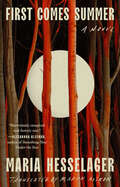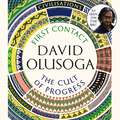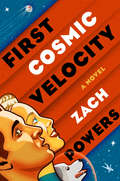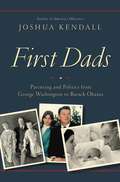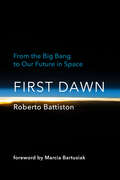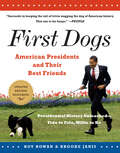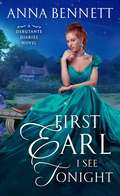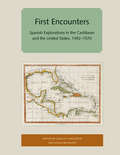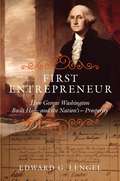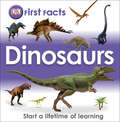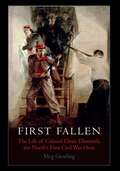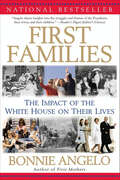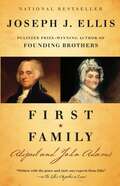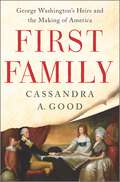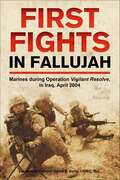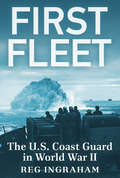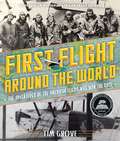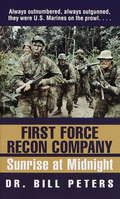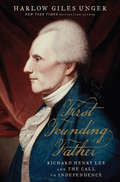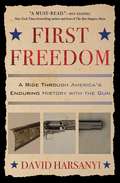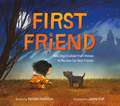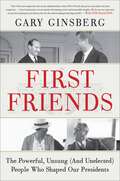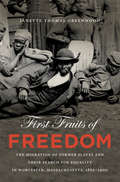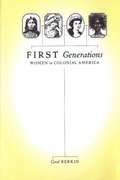- Table View
- List View
First Comes Summer: A Novel
by Maria HesselagerThe spellbinding story of a young woman&’s dangerous passion as it plays out over the course of an eerie summerIn their remote Viking settlement, Folkvíand her brother, Áslakr, have always been close—unnaturally close. They&’ve grown more intimate still as Folkví learns her shaman mother&’s craft, as men regard her with newly devouring eyes. Then illness carries off their parents, and the nest of home is shattered. Áslakr sets off on his first expedition, abandoning Folkví to the dark of an endless winter. When he returns, he&’s done the unthinkable: He&’s found someone else to love. Sick with grief, Folkví rages to the gods where they sit at the foot of an ancient tree, contemplating the twisted passions of humans that play out in the face of an ever-approaching end of days. Will none of them save her now? Very well, Folkví will save herself. The wedding date is set. But first comes a fateful summer. . . Deeply unsettling and brilliantly imagined, First Comes Summer captures the terror of losing the world you&’ve always known—and the uncanny extremes to which you might go to hold on to it.
First Contact/The Cult of Progress
by David OlusogaOscar Wilde said 'Life imitates Art far more than Art imitates Life.' Was he right? In Civilisations, David Olusoga travels the world to piece together the shared histories that link nations.In Part One, First Contact, we discover what happened to art in the great Age of Discovery, when civilisations encountered each other for the first time. Although undoubtedly a period of conquest and destruction, it was also one of mutual curiosity, global trade and the exchange of ideas.In Part Two, The Cult of Progress, we see how the Industrial Revolution transformed the world, impacting every corner, and every civilisation, from the cotton mills of the Midlands through Napoleon's conquest of Egypt to the decimation of both Native American and Maori populations and the advent of photography in Paris in 1839.Incredible art - both looted and created - relays the key events and their outcomes throughout the world.
First Cosmic Velocity
by Zach PowersA stunningly imaginative novel about the Cold War, the Russian space program, and the amazing fraud that pulled the wool over the eyes of the world.It's 1964 in the USSR, and unbeknownst even to Premier Khrushchev himself, the Soviet space program is a sham. Well, half a sham. While the program has successfully launched five capsules into space, the Chief Designer and his team have never successfully brought one back to earth. To disguise this, they've used twins. But in a nation built on secrets and propaganda, the biggest lie of all is about to unravel.Because there are no more twins left.Combining history and fiction, the real and the mystical, First Cosmic Velocity is the story of Leonid, the last of the twins. Taken in 1950 from a life of poverty in Ukraine to the training grounds in Russia, the Leonids were given one name and one identity, but divergent fates. Now one Leonid has launched to certain death (or so one might think...), and the other is sent on a press tour under the watchful eye of Ignatius, the government agent who knows too much but gives away little. And while Leonid battles his increasing doubts about their deceitful project, the Chief Designer must scramble to perfect a working spacecraft, especially when Khrushchev nominates his high-strung, squirrel-like dog for the first canine mission.By turns grim and whimsical, fatalistic and deeply hopeful, First Cosmic Velocity is a sweeping novel of the heights of mankind's accomplishments, the depths of its folly, and the people--and canines--with whom we create family.
First Dads: Parenting and Politics from George Washington to Barack Obama
by Joshua KendallEvery president has had some experience as a parent. Of the 43 men who have served in the nation's highest office, 38 have fathered biological children and the other five adopted children. Each president's parenting style reveals much about his beliefs as well as his psychological make-up. James Garfield enjoyed jumping on the bed with his kids. FDR's children, on the other hand, had to make appointments to talk to him. In a lively narrative, based on research in archives around the country, Kendall shows presidential character in action. Readers will learn which type of parent might be best suited to leading the American people and, finally, how the fathering experiences of our presidents have forever changed the course of American history.
First Dawn: From the Big Bang to Our Future in Space
by Roberto BattistonFrom the very first moments of the universe to the birth of the first star, our solar system, and our planet: a physicist traces the known and the unknown.Since the beginning of the twentieth century, the horizon of our knowledge about the universe has expanded to encompass the infinitesimally small—and the infinitely vast. In First Dawn, physicist Roberto Battiston takes readers on a journey through space and time, to the boundaries of our knowledge and beyond. From the violence of the Big Bang and the birth of the first star, hundreds of millions of years later, to the emergence of our solar system, the dawn of life on Earth, and the possibility of life on other planets, Battiston maps what we know about the universe and how we came to know it—cautioning us, however, that what we know is a minuscule fraction of what there is to know. Battiston outlines discoveries by some of the greatest theoretical physicists of the twentieth century, including Einstein, Bohr, Schrödinger, Heisenberg, Fermi, and Hubble; discusses the mysteries of dark energy and dark matter; and considers what it means for the universe to have emerged out of nothing. The ignition of the first star illuminated a universe that had been expanding, unobserved and unobservable, in the dark. Drawing on his own research, Battiston discusses the birth of the Sun, the formation of planets, the origins of life, interstellar migrations, extrasolar planets, black holes, gravitational waves, and much more. But, he warns, for some questions—the dimensions of the universe, for example, or the existence of other universes—we are destined to remain in the realm of speculation.
First Dog Fala
by Elizabeth Van SteenwykMeet the Scottish terrier who won the hearts of a United States president and the American people.In 1940, Fala came to live with President Franklin D. Roosevelt in the White House. The little dog played in the grass outside the Oval Office, attended important meetings with the president's advisors, and even dined with the president. But as America was drawn into the conflict of a world war, life at the White House changed. Fala accompanied the president across the country and around the world, waiting with him for the return of American servicemen and an end to a terrible war.Author Elizabeth Van Steenwyk offers young readers a glimpse into American history and the life of an American president through the story of a loyal dog. Michael G. Montgomery's full-color illustrations capture the indomitable spirit of Fala and the nation and president who loved him.
First Dogs: American Presidents and Their Best Friends
by Brooke Janis Roy Rowan<P>"If you want a friend in Washington, get a dog," Harry Truman once said. <P>Perhaps that's why, for much of our Republic's history, there have been two top dogs at 1600 Pennsylvania Avenue—one with two legs, one with four. <P>First Dogs, by distinguished journalist Roy Rowan and researcher Brooke Janis, tells the whole doggone story, from the days before there was a White House to Barack Obama’s newly adopted presidential pup, Bo. <P>Here's a lighthearted romp through American history, packed with drawings and paintings from early America, plus photographs, starting with Abraham Lincoln's Fido. Not only did these four-footed goodwill ambassadors humanize their distinguished masters, they offered them a little unconditional love in a loveless town. <P>First Dogs gives dog lovers and history lovers a new angle on presidential history and is more fun than you can shake a stick (or rubber bone) at.
First Earl I See Tonight: A Debutante Diaries Novel (Debutante Diaries #1)
by Anna BennettOnce upon a time three young ladies vowed to record their first London seasons…and to fill in the gaps of their finishing school educations. Thus began The Debutante Diaries—and London will never be the same…“Fans of Regency romance authors Eloisa James, Tessa Dare, and Mary Jo Putney will go wild.”—Booklist An heiress with a daring proposal. An earl who’s determined to resist her. And a love that just might be written in the stars, in First Earl I See Tonight by Anna Bennett.Recently jilted by his fiancée, David Gray, Earl of Ravenport is not in the market for a wife. Even if Gray didn’t have his hands full renovating his crumbling country house, it would take more than a bold marriage proposal from a headstrong young beauty to thaw his frozen heart. Gray is confident that spending a week at his ramshackle estate will change her mind about marriage, but every passionate moment he spends with her tempts him to change his…A talented artist, Miss Fiona Hartley desperately needs her dowry money to pay off a blackmailer set on ruining her sister. The handsome earl seems a sensible choice for a husband…if only she can convince him that romance will play no part. But marrying in name only may prove difficult for Fiona. Gray can’t help but be dazzled by her genuine warmth. Yet as their feelings deepen, Fiona’s deadline looms. Will her secrets destroy them, or is true love their final destiny?
First Encounters: Spanish Explorations in the Caribbean and the United States, 1492-1570 (Florida and the Caribbean Open Books Series #No. 9)
by Susan Milbrath Jerald T. MilanichThe books in the Florida and the Caribbean Open Books Series demonstrate the University Press of Florida’s long history of publishing Latin American and Caribbean studies titles that connect in and through Florida, highlighting the connections between the Sunshine State and its neighboring islands. Books in this series show how early explorers found and settled Florida and the Caribbean. They tell the tales of early pioneers, both foreign and domestic. They examine topics critical to the area such as travel, migration, economic opportunity, and tourism. They look at the growth of Florida and the Caribbean and the attendant pressures on the environment, culture, urban development, and the movement of peoples, both forced and voluntary. The Florida and the Caribbean Open Books Series gathers the rich data available in these architectural, archaeological, cultural, and historical works, as well as the travelogues and naturalists’ sketches of the area in prior to the twentieth century, making it accessible for scholars and the general public alike. The Florida and the Caribbean Open Books Series is made possible through a grant from the National Endowment for the Humanities and the Andrew W. Mellon Foundation, under the Humanities Open Books program.
First Entrepreneur: How George Washington Built His--and The Nation's--prosperity
by Edward LengelGeorge Washington was not only "first in war, first in peace, and first in the hearts of his countrymen"--he was also America's most important entrepreneur.
First Facts: Start a Lifetime of Learning (First Facts)
by DKGet all the facts! First Facts is a early learning series that explains to young readers everything they want to know about exciting topics like the natural world, history, science, and machines. Fitting perfectly between preschool and elementary school levels, this series boasts visually exciting spreads that encourage children to flip through regardless of whether they can read yet. The text offers a basic foundation on the subject and is full of fascinating facts and figures — perfect for reading aloud, or for kids to decipher on their own when they're learning to read.
First Fallen: The Life of Colonel Elmer Ellsworth, the North’s First Civil War Hero
by Meg GroelingOn May 24, 1861, Col. Elmer Ellsworth became the first Union officer killed in the Civil War. The entire North was aghast. First Fallen is the first modern biography of this national celebrity, Northern icon, and mostly forgotten national hero. Ellsworth and his entertaining U.S. Zouave Cadets drill team had performed at West Point, in New York City, and for President, James Buchanan before returning home to Chicago. He helped his friend and law mentor Abraham Lincoln in his quest for the presidency, and when Lincoln put out the call for troops after Fort Sumter was fired upon, Ellsworth responded. Within days he organized more than 1,000 New York firefighters into a regiment of volunteers. When he was killed, the Lincolns rushed to the Navy Yard to view the body of the young man they had loved as a son. Mary Lincoln insisted he lie in state in the East Room of the White House. The elite of New York brought flowers to the Astor House and six members of the 11th New York accompanied their commander’s coffin. When a late May afternoon thunderstorm erupted during his funeral service at the Hudson View Cemetery, eyewitnesses referred to it as “tears from God himself.” The death of the young hero was knocked out of the headlines eight weeks later by the battle of First Bull Run. The trickle of blood had now become a torrent that would not stop for four long years. Groeling’s well-written biography is grounded in years of archival research and includes diaries, personal letters, newspapers, and many other accounts. In the six decades since the last portrait of Ellsworth was written, new information has been found that gives readers and historians a better understanding of the Ellsworth phenomenon and his deep connections to the Lincoln family. First Fallen: The Life of Colonel Elmer Ellsworth, the North’s First Civil War Hero examines every facet of Ellsworth’s complex, fascinating life and adds richly to the historiography of the Civil War.
First Families: The Impact of the White House on Their Lives
by Bonnie AngeloA deeply revealing look at presidential family members through history: “Full of sparkling anecdotes . . . [written] with humor and humanity.” —Richmond Times-DispatchWhat is it like when the White House is home? In this book, Time correspondent and author of First Mothers Bonnie Angelo tells the real-life stories of how presidents and their wives, children, and extended families lived day-to-day in an imposing national monument while attempting to keep their private lives out of the public domain.First Families chronicles exhilarating moments as well as dark days at the nation’s most famous address, with behind-the-headlines accounts of picture-book weddings, love affairs, rollicking children, domestic squabbles, and tragic deaths. From activist wives Eleanor Roosevelt and Hillary Clinton to reluctant occupants Bess Truman and Jacqueline Kennedy, to those such as Mary Todd Lincoln, Dolley Madison, and madcap debutante Alice Roosevelt, who embraced their new address and status, here is an unforgettable human portrait of our First Families and how they coped, stumbled, or thrived in the national spotlight.Includes photographs“A sweeping panorama of family life on Pennsylvania Avenue . . . revealing and intimate.” —Kirkus Reviews (starred review)“Makes the lives of those who either loved or loathed their sojourns in the White House as irresistible as a gossip column . . . Angelo is particularly skilled at describing the difficulties White House children, including Lyndon Johnson’s daughters and Amy Carter, had adjusting to life in a fish bowl.” —Publishers Weekly“Covers more than 200 years of American history, popular culture, and presidential trivia. Relying heavily on the recollections and memoirs of presidential family members, White House staff, and D.C. journalists, this chatty slice of Americana is chock-full of fun First Family facts.” —Booklist
First Family: Abigail and John Adams
by Joseph J. EllisThe Pulitzer Prize–winning, best-selling author of Founding Brothers and His Excellency brings America’s preeminent first couple to life in a moving and illuminating narrative that sweeps through the American Revolution and the republic’s tenuous early years.John and Abigail Adams left an indelible and remarkably preserved portrait of their lives together in their personal correspondence: both Adamses were prolific letter writers (although John conceded that Abigail was clearly the more gifted of the two), and over the years they exchanged more than twelve hundred letters. Joseph J. Ellis distills this unprecedented and unsurpassed record to give us an account both intimate and panoramic; part biography, part political history, and part love story.Ellis describes the first meeting between the two as inauspicious—John was twenty-four, Abigail just fifteen, and each was entirely unimpressed with the other. But they soon began a passionate correspondence that resulted in their marriage five years later.Over the next decades, the couple were separated nearly as much as they were together. John’s political career took him first to Philadelphia, where he became the boldest advocate for the measures that would lead to the Declaration of Independence. Yet in order to attend the Second Continental Congress, he left his wife and children in the middle of the war zone that had by then engulfed Massachusetts. Later he was sent to Paris, where he served as a minister to the court of France alongside Benjamin Franklin. These years apart stressed the Adamses’ union almost beyond what it could bear: Abigail grew lonely, while the Adams children suffered from their father’s absence.John was elected the nation’s first vice president, but by the time of his reelection, Abigail’s health prevented her from joining him in Philadelphia, the interim capital. She no doubt had further reservations about moving to the swamp on the Potomac when John became president, although this time he persuaded her. President Adams inherited a weak and bitterly divided country from George Washington. The political situation was perilous at best, and he needed his closest advisor by his side: “I can do nothing,” John told Abigail after his election, “without you.”In Ellis’s rich and striking new history, John and Abigail’s relationship unfolds in the context of America’s birth as a nation.
First Family: George Washington's Heirs and the Making of America
by Cassandra A. GoodAward-winning historian Cassandra A. Good shows how the outspoken stepgrandchildren of George Washington played an overlooked but important role in the development of American society and politics from the Revolution to the Civil War.While it&’s widely known in America that George and Martha Washington never had children of their own, few are aware that they raised numerous children together. In First Family, we see Washington as a father figure, as well as meet the children he helped raise and trace their complicated roles in American history.The children of Martha Washington&’s son by her first marriage—Eliza, Patty, Nelly and Wash Custis—were born into life in the public eye. Raised in the country&’s first &“first family,&” they remained well-known as Washington&’s family and keepers of his legacy throughout their lives. By turns petty and powerful, glamorous and cruel, the Custises used Washington as a means to enhance their own power and status. As enslavers committed to the American empire, the Custis family embodied the failures of the American experiment that finally exploded into civil war—all the while being celebrities in a soap opera of their own making.First Family brings new focus and attention to this surprisingly neglected aspect of George Washington&’s life and legacy. As the country grapples with concerns about political dynasties and the public role of presidential families, the saga of Washington&’s family offers a human story of historical precedent.
First Fights in Fallujah: Marines During Operation Vigilant Resolve, in Iraq, April 2004
by David E. Kelly"This book will add to the long and distinguished collection of marine history and is well worth the read for anyone interested in personal accounts of modern combat. It also provides a good snapshot into urban combat and the tactics and techniques necessary to succeed in it." — Military ReviewIn March 2004, the unprovoked ambush killing and desecration of the bodies of American civilian security contractors in Fallujah, Iraq, caused the National Command Authorities in Washington, DC. to demand that the newly arrived Marine Expeditionary Force there take action against the perpetrators and other insurgent forces. Planned Stability and Support Operations were cast aside as insurgent fighters dared the Marines to enter Fallujah. Marine infantrymen, tankers, helicopter crews, and amphibious vehicle drivers all pitched into high-intensity battles and firefights during the first fights of Fallujah in April 2004. Across the board cooperation and innovation marked these fighting Marines in combined arms fights that no one expected. Marines fought in the streets, conducted house-to-house searches, cleared buildings of enemy, and used tank main guns in direct support of urban environment operations. Helicopter crews supported operations on the ground with rockets and machine-gun fire, and Amtrac Marines transported forces to face enemy RPG and machine-gun fire. Marines from infantry squad members to a battalion commander were interviewed by Marine Corps field historians within days or weeks of the events at nearby combat outposts and camps. This book combines these interview notes and the words of the men themselves to create a unique narrative of Marines in this combat. Casualties only stiffened the will of the Marines to crush the enemy. A late April political plan called for the withdrawal of Marine forces from the city, and Marines at every level, though frustrated, understood the need to allow this attempted solution to play itself out.
First Fleet: The U.S. Coast Guard in World War II
by Reg IngrahamFirst Fleet, first published in 1944, is a fast-paced account of the important role played by the U.S. Coast Guard during the Second World War (with background chapters on the early history and peacetime activities of the Coast Guard). Featuring numerous interviews with servicemen in the U.S., Pacific, Atlantic, Mediterranean, and Greenland, First Fleet provides an insider’s look at the unsung heroes and vital work performed by the Coast Guard, not only in the United States, but in every war-time theater of operation. Activities described include ocean- and shore-patrols, U-boat hunting, transport of U.S. Marines in the Pacific, rescue work and the development of better lifeboats, fire-fighting, and the Public Health Service. First Fleet, one of only a handful of books on the Coast Guard in World War II, is a classic account of bravery and courage under difficult conditions. Included are 23 pages of illustrations.
First Flight Around The World: The Adventures Of The American Fliers Who Won The Race
by Tim GroveA 2016 YALSA Award for Excellence in Nonfiction for Young Adults Finalist<P><P> In 1924 the U.S. Army sent eight young men on a bold attempt to be the first to circumnavigate the globe by flight. Men from five other countries—Great Britain, France, Portugal, Italy, and Argentina—had the same goal. The race was on!<P> First Flight Around the World documents the exciting journey of four American planes—the Chicago, Boston, New Orleans, and Seattle—and their crews on a race around the world. The trip held many challenges: extreme weather, tricky navigation, unfamiliar cultures, fragile planes, and few airfields. The world fliers risked their lives for the sake of national pride.<P> Based in part on the journal of one of the crew members, First Lieutenant Leslie Arnold, along with commentary, newspaper reports, and archival images, First Flight Around the World is a captivating tale about American ingenuity, gumption, and perseverance.
First Force Recon Company
by Bill PetersIn 1st Force Recon you performed at a very high level of proficiency. Or you died. . . .In 1969, First Lieutenant Bill Peters and the Force Recon Marines had one of the most difficult, dangerous assignments in Vietnam. From the DMZ to the Central Highlands, their job was to provide strategic and operational intelligence to insure the security of American units as the withdrawal of the troops progressed.Making perilous helicopter inserts deep in the Que Son Mountains, where the constant chatter of AK-47 rifle fire left no doubt who was in charge, Peters and the other men of 1st Force Recon Company risked their lives every day in six-man teams, never knowing whether they would live to see the sunset. Peters's accounts of silently watching huge movements of heavily armed NVA regulars, prisoner snatches, sudden-death ambushes, and extracts from fiercely fought firefights vividly capture the realities of Recon Marine warfare, and offer a gritty tribute to the courage, heroism, and sacrifice of the U. S. Marines. . . .From the Paperback edition.
First Founding Father: Richard Henry Lee and the Call to Independence
by Harlow Giles UngerBefore Washington, before Jefferson, before Franklin or John Adams, there was Lee--Richard Henry Lee, the First Founding FatherRichard Henry Lee was first to call for independence, first to cal for union, and first to call for a bill of rights to protect Americans against government tyranny. A towering figure in America's Revolutionary War, Lee was as much the "father of our country" as George Washington, for it was Lee who secured the political and diplomatic victories that ensured Washington's military victories. Lee was critical in holding Congress together at a time when many members sought to surrender or flee the approach of British troops. Risking death on the gallows for defying British rule, Lee charged into battle himself to prevent British landings along the Virginia coast--despite losing most of his left hand in an explosion.A stirring, action-packed biography, First Founding Father will startle most Americans with the revelation that many historians have ignored for more than two centuries: Richard Henry Lee, not Thomas Jefferson, was the author of America's original Declaration of Independence.
First Freedom: A Ride Through America's Enduring History with the Gun
by David HarsanyiFrom “one of America’s smartest political writers” (Glenn Beck) comes a fascinating and accessible history of the United States’ unique and enduring relationship with guns, for fans of Chris Kyle’s American Gun.For America, the gun is a story of innovation, power, violence, character, and freedom. From the founding of the nation to the pioneering of the West, from the freeing of the slaves to the urbanization of the twentieth century, our country has had a complex and lasting relationship with firearms. Now, in First Freedom, nationally syndicated columnist and veteran writer David Harsanyi explores the ways in which firearms have helped preserve our religious, economic, and cultural institutions for over two centuries. From Samuel Colt’s early entrepreneurism to the successful firearms technology that helped make the United States a superpower, the gun is inextricably tied to our exceptional rise. In the vein of popular histories like Salt and Seabiscuit, Harsanyi takes you on a captivating and thrilling ride of Second Amendment history that demonstrates why guns are not only an integral part of America’s past, but also an essential part of its future.
First Friend: How Dogs Evolved from Wolves to Become Our Best Friends
by Kersten HamiltonWith lyrical text by Kersten Hamilton and luminous illustrations by Jaime Kim, First Friend is an exploration of how the wild wolves became dogs, and how we learned to communicate and grow alongside the creatures we love.Long, long ago, when the world was new. . .a girl met a pup.In those days, everyone knew that wolves and children could not be friends. Still, they learned from each other—how to hunt, how to trade, how to survive, how to play. And years and years went by, and the world spun and changed. And then—a boy fished with a wolf, and a girl traded with a wild dog, and animal and human grew up side by side. . .into the best friends we are today.
First Friends: The Powerful, Unsung (And Unelected) People Who Shaped Our Presidents
by Gary GinsbergIn the bestselling tradition of The Presidents Club and Presidential Courage, White House history as told through the stories of the best friends and closest confidants of American presidents. <P><P> Here are the riveting histories of myriad presidential friendships, among them: <br>Abraham Lincoln and Joshua Speed: They shared a bed for four years during which Speed saved his friend from a crippling depression. Two decades later the friends worked together to save the Union. <br>Harry Truman and Eddie Jacobson: When Truman wavered on whether to recognize the state of Israel in 1948, his lifelong friend and former business partner intervened at just the right moment with just the right words to steer the president’s decision. <br>Franklin Delano Roosevelt and Daisy Suckley: Unassuming and overlooked during her lifetime, Daisy Suckley was in reality FDR’s most trusted, constant confidant, the respite for a lonely and overworked President navigating the Great Depression and World War II <br>John Kennedy and David Ormsby-Gore: They met as young men in pre-war London and began a conversation over the meaning of leadership. A generation later the Cuban Missile Crisis would put their ideas to test as Ormsby-Gore became the president’s unofficial, but most valued foreign policy advisor. <P><P> These and other friendships—including Thomas Jefferson and James Madison, Franklin Pierce and Nathaniel Hawthorne, and Bill Clinton and Vernon Jordan—populate this fresh and provocative exploration of a series of seminal presidential friendships. <P><P> Publishing history teems with books by and about Presidents, First Ladies, First Pets, and even First Chefs. Now former Clinton aide Gary Ginsberg breaks new literary ground on Pennsylvania Avenue and provides fresh insights into the lives of the men who held the most powerful political office in the world by looking at the friends on whom they relied. <P><P>First Friends is an engaging, serendipitous look into the lives of Commanders-in-Chief and how their presidencies were shaped by those they held most dear. <P><P><b>A New York Times Best Seller</b>
First Fruits of Freedom: The Migration of Former Slaves and Their Search for Equality in Worcester, Massachusetts, 1862-1900
by Janette Thomas GreenwoodA moving narrative that offers a rare glimpse into the lives of African American men, women, and children on the cusp of freedom, First Fruits of Freedom chronicles one of the first collective migrations of blacks from the South to the North during and after the Civil War. Janette Thomas Greenwood relates the history of a network forged between Worcester County, Massachusetts, and eastern North Carolina as a result of Worcester regiments taking control of northeastern North Carolina during the war. White soldiers from Worcester, a hotbed of abolitionism, protected refugee slaves, set up schools for them, and led them north at war's end. White patrons and a supportive black community helped many migrants fulfill their aspirations for complete emancipation and facilitated the arrival of additional family members and friends. Migrants established a small black community in Worcester with a distinctive southern flavor. But even in the North, white sympathy did not continue after the Civil War. Despite their many efforts, black Worcesterites were generally disappointed in their hopes for full-fledged citizenship, reflecting the larger national trajectory of Reconstruction and its aftermath.
First Generations: Women In Colonial America
by Carol BerkinCarol Berkin's multicultural history reconstructs the lives of American women in the seventeenth and eighteenth centuries-women from European, African, and Native backgrounds-and examines their varied roles as wives, mothers, household managers, laborers, rebels, and, ultimately, critical forces in shaping the new nation's culture and history.
